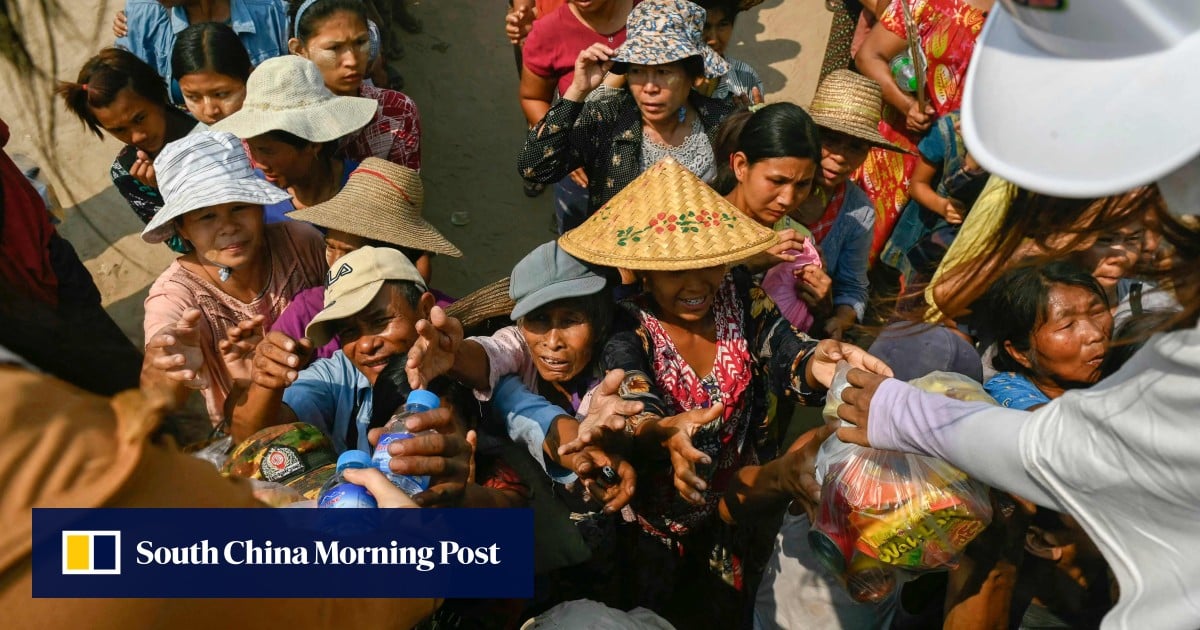
Myanmar Earthquake Crisis Exacerbated by Brutal Junta Regime Policies
The devastating earthquake that struck Myanmar recently has brought to light not only the fragility of the region's natural environment but also the harsh realities of living under a draconian regime. The aftermath of this natural disaster is being felt more acutely due to the uncompromising stance of Myanmar’s military junta, which has shown little empathy or support for its beleaguered citizens.
A Nation in Peril
Myanmar, located in a seismically active region, has faced its fair share of natural disasters. Yet, the recent earthquake has been particularly catastrophic, causing extensive damage to infrastructure and leaving countless people without shelter. The situation is dire, and the need for humanitarian assistance is more pressing than ever.
The junta's response, however, has been tragically inadequate. Instead of mobilizing resources to aid recovery, the regime's actions have been perceived as punitive. Critics argue that the junta uses the chaos and suffering caused by the earthquake as a tool for further control, implementing policies that serve its authoritarian agenda rather than the welfare of the people.
Humanitarian Crisis Amidst Political Strife
Natural disasters have historically exposed the weaknesses in governance, and Myanmar is no exception. The junta's priorities appear misaligned, with reports suggesting that aid distribution is being manipulated to reward loyalty. Communities suspected of opposing the regime are allegedly denied essential supplies, while areas with strong military support receive disproportionate assistance.
This selective aid distribution exacerbates existing inequalities and prolongs the suffering of those most in need. With international aid organizations having limited access due to restrictive governmental policies, the scope for external intervention remains constrained. Consequently, the local population is left in a precarious position, grappling with both a natural and political crisis.
International Community's Response
The international community has expressed concern over the plight of Myanmar's citizens. Human rights organizations and various governments have called for increased pressure on the junta to allow unfettered access to humanitarian aid across the country. However, diplomatic efforts have faced obstacles as the junta remains unyielding.
Countries like the United States and members of the European Union have imposed sanctions, hoping to sway the regime's actions. Yet, the impact of these sanctions on the junta’s policies towards disaster management and humanitarian aid is still uncertain. Myanmar’s military leadership remains steadfast, seemingly impervious to international censure.
The Role of Local and International NGOs
In the face of governmental inadequacies, non-governmental organizations (NGOs) have stepped up efforts to assist affected communities. Local NGOs, often operating under strict surveillance, continue to deliver essential services wherever possible. Their efforts are complemented by international NGOs, which provide support through financial aid and logistical assistance.
Despite these efforts, the challenges persist. Myanmar's restrictive policies hinder NGOs' ability to operate effectively, limiting overall impact. The junta’s interference in aid operations complicates coordinated attempts at relief, leaving many communities without necessary assistance. This underscores the urgent need for a collaborative approach that involves both local stakeholders and international entities.
Stories of Resilience and Solidarity
Amidst the turmoil, stories of resilience emerge from within Myanmar’s communities. Citizens have organized grassroots initiatives to support one another, overcoming barriers posed by the regime. These communal efforts demonstrate the enduring spirit and solidarity among Myanmar’s people, providing a glimmer of hope in an otherwise grim situation.
Volunteers, often at great personal risk, are distributing supplies and offering medical aid. Their selfless contributions highlight the enduring strength and resilience of the human spirit. Such acts of kindness and bravery serve as a counter-narrative to the oppressive dynamics imposed by the junta.
The Long Road Ahead
The journey towards recovery for Myanmar is fraught with challenges, not only from the wreckage of the earthquake but also from its political landscape. Genuine rehabilitation necessitates not just the rebuilding of infrastructure but also the restoration of trust and democratic governance.
The need for comprehensive strategies that address both immediate relief and long-term stability is critical. International solidarity and persistent advocacy remain pivotal in ensuring that Myanmar does not face this crisis alone. As global attention focuses on the region, continued engagement is essential in pressuring the junta towards more humane policies.
Conclusion: A Call for Compassion and Action
The earthquake crisis in Myanmar illustrates a harsh reality where natural and man-made disasters intersect, leaving civilians trapped in a cycle of suffering. The global community must advocate for equitable aid distribution and demand accountability from Myanmar's military regime.
As the world watches, it is imperative that international efforts translate into tangible support and protection for those caught in the crossfire of nature and politics. The road to recovery is long, but with collective resolve, Myanmar can move towards a future that honors both the resilience of its people and the principles of humanitarianism and democracy.


